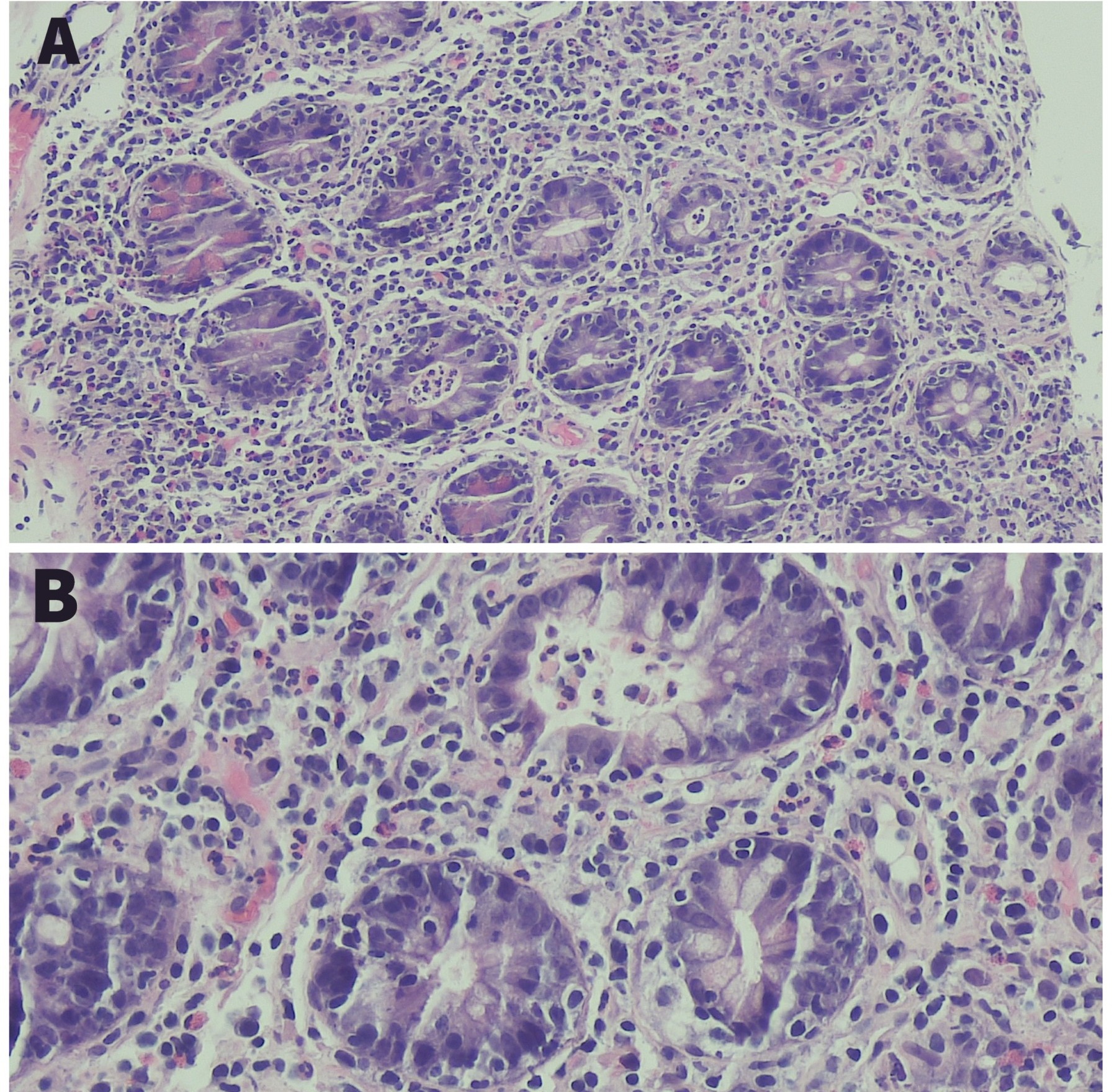Back
Poster Session E - Tuesday Afternoon
E0671 - Severe Immune Checkpoint Inhibitor Enteritis Treated With Infliximab: Insurance Steered the Wheel
Tuesday, October 25, 2022
3:00 PM – 5:00 PM ET
Location: Crown Ballroom

Ifrah Fatima, MD
University of Missouri-Kansas City
Kansas City, MO
Presenting Author(s)
Ifrah Fatima, MD1, Kimberly Sanders, MD2, Jennifer Von Ende, MD2, Valerica Mateescu, MD2, Tahar Mahmoudi, MD2, Esmat Sadeddin, MD3, Hassan Ghoz, MD3
1University of Missouri-Kansas City, Kansas City, MO; 2University of Missouri, Kansas City, MO; 3University of Missouri Kansas City School of Medicine, Kansas City, MO
Introduction: There is limited published data regarding severe steroid-refractory isolated ICI enteritis. Vedolizumab seems to be effective in treating ICI colitis with a better safety profile when compared to Infliximab. However, some insurance companies are not approving it for therapy. We present a case of severe isolated steroid-refractory ICI enteritis successfully treated with Infliximab following an insurance denial for Vedolizumab coverage.
Case Description/Methods: A 59-year-old female with a history of metastatic renal cell carcinoma (RCC) status post left nephrectomy who has recently been treated with Axitinib and Pembrolizumabt therapy, presented with acute abdominal pain and diarrhea. Immunotherapy was discontinued and she received high-dose steroid therapy for 7 days for presumed ICI-induced diarrhea with no improvement. Abdominal exam was concerning for abdominal distention. Abdominal imaging showed extensive pneumatosis in mid-distal small bowel, moderate pneumoperitoneum, and diffuse small bowel perforation. She underwent an emergent exploratory laparotomy with distal ileal resection (22.5cm) and end-ileostomy. Her hospital course was complicated by intraabdominal abscesses and persistent high volume ostomy output (9-10L/day) despite a trial Imodium, high dose steroids, tincture of opium, octreotide, and fiber. Infectious workup, fecal elastase, celiac screen, VIP, TSH, gastrin levels were normal. Ileoscopy was performed showing normal mucosa, however, biopsies showed an increase in lamina propria inflammatory cells, cryptitis, crypt abscesses, and apoptotic bodies, consistent with chronic active enteritis/immunotherapy-related changes (Fig 1). Vedolizumab was denied by insurance despite multiple appeals and therefore, Infliximab 5 mg/kg was started. A significant improvement was noticed following one dose of Infliximab. The patient had complete resolution of symptoms and eventual ileostomy reversal.
Discussion: Infliximab is effective in treating severe isolated ICI enteritis. Although current literature favors Vedolizumab given its higher safety profile, especially given infection and malignancy in our case, the insurance company denied our request and appeal. Ongoing studies showing a higher safety profile of Vedolizumab in treating ICI enteritis will likely change insurance approval processes in the coming years.

Disclosures:
Ifrah Fatima, MD1, Kimberly Sanders, MD2, Jennifer Von Ende, MD2, Valerica Mateescu, MD2, Tahar Mahmoudi, MD2, Esmat Sadeddin, MD3, Hassan Ghoz, MD3. E0671 - Severe Immune Checkpoint Inhibitor Enteritis Treated With Infliximab: Insurance Steered the Wheel, ACG 2022 Annual Scientific Meeting Abstracts. Charlotte, NC: American College of Gastroenterology.
1University of Missouri-Kansas City, Kansas City, MO; 2University of Missouri, Kansas City, MO; 3University of Missouri Kansas City School of Medicine, Kansas City, MO
Introduction: There is limited published data regarding severe steroid-refractory isolated ICI enteritis. Vedolizumab seems to be effective in treating ICI colitis with a better safety profile when compared to Infliximab. However, some insurance companies are not approving it for therapy. We present a case of severe isolated steroid-refractory ICI enteritis successfully treated with Infliximab following an insurance denial for Vedolizumab coverage.
Case Description/Methods: A 59-year-old female with a history of metastatic renal cell carcinoma (RCC) status post left nephrectomy who has recently been treated with Axitinib and Pembrolizumabt therapy, presented with acute abdominal pain and diarrhea. Immunotherapy was discontinued and she received high-dose steroid therapy for 7 days for presumed ICI-induced diarrhea with no improvement. Abdominal exam was concerning for abdominal distention. Abdominal imaging showed extensive pneumatosis in mid-distal small bowel, moderate pneumoperitoneum, and diffuse small bowel perforation. She underwent an emergent exploratory laparotomy with distal ileal resection (22.5cm) and end-ileostomy. Her hospital course was complicated by intraabdominal abscesses and persistent high volume ostomy output (9-10L/day) despite a trial Imodium, high dose steroids, tincture of opium, octreotide, and fiber. Infectious workup, fecal elastase, celiac screen, VIP, TSH, gastrin levels were normal. Ileoscopy was performed showing normal mucosa, however, biopsies showed an increase in lamina propria inflammatory cells, cryptitis, crypt abscesses, and apoptotic bodies, consistent with chronic active enteritis/immunotherapy-related changes (Fig 1). Vedolizumab was denied by insurance despite multiple appeals and therefore, Infliximab 5 mg/kg was started. A significant improvement was noticed following one dose of Infliximab. The patient had complete resolution of symptoms and eventual ileostomy reversal.
Discussion: Infliximab is effective in treating severe isolated ICI enteritis. Although current literature favors Vedolizumab given its higher safety profile, especially given infection and malignancy in our case, the insurance company denied our request and appeal. Ongoing studies showing a higher safety profile of Vedolizumab in treating ICI enteritis will likely change insurance approval processes in the coming years.

Figure: Inflammatory cells in lamina propria, cryptitis, crypt abscesses, and apoptotic bodies
A: Small bowel biopsy Hematoxylin & Eosin (H&E) stain, 100X
B: Small bowel biopsy Hematoxylin & Eosin (H&E) stain, 200X
A: Small bowel biopsy Hematoxylin & Eosin (H&E) stain, 100X
B: Small bowel biopsy Hematoxylin & Eosin (H&E) stain, 200X
Disclosures:
Ifrah Fatima indicated no relevant financial relationships.
Kimberly Sanders indicated no relevant financial relationships.
Jennifer Von Ende indicated no relevant financial relationships.
Valerica Mateescu indicated no relevant financial relationships.
Tahar Mahmoudi indicated no relevant financial relationships.
Esmat Sadeddin indicated no relevant financial relationships.
Hassan Ghoz indicated no relevant financial relationships.
Ifrah Fatima, MD1, Kimberly Sanders, MD2, Jennifer Von Ende, MD2, Valerica Mateescu, MD2, Tahar Mahmoudi, MD2, Esmat Sadeddin, MD3, Hassan Ghoz, MD3. E0671 - Severe Immune Checkpoint Inhibitor Enteritis Treated With Infliximab: Insurance Steered the Wheel, ACG 2022 Annual Scientific Meeting Abstracts. Charlotte, NC: American College of Gastroenterology.
